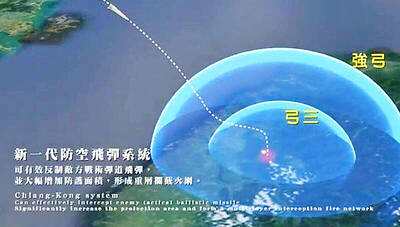One year on from the Sunflower movement, people are now more supportive of a third political force in next year’s legislative elections, a survey conducted by the Taiwan Brain Trust showed yesterday.
“The Sunflower movement last year was a very important event in Taiwanese politics; it certainly contributed to the election of independent Taipei Mayor Ko Wen-je (柯文哲) and could have an impact on next year’s legislative election,” the think tank’s chairman, Wu Rong-i (吳榮義), told a news conference to release the results of the poll conducted last week on current political issues.
“According to the poll, 46.4 percent of respondents said they might or would definitely support candidates from a third political force and 46 percent said they would cast their second vote for a third political party,” Wu said.

Photo: Chien Jung-fong, Taipei Times
As many as 58.4 percent of respondents believed that the Chinese Nationalist Party (KMT) was defeated in last year’s nine-in-one elections not by the Democratic Progressive Party (DPP), but by young voters and society as a whole, Wu added.
“As many as 54.9 percent of respondents are opposed to the prosecution of people who took part in the Sunflower movement, and only 37.8 percent believe the prosecutions are legitimate,” Wu said.
However, although 72.3 percent of respondents believe that the DPP will defeat the KMT in next year’s presidential election, the results of the poll show that the DPP’s support rate, while higher than the KMT’s, is dropping.
“The support rate for the KMT grew slightly from 11 percent [in December] to 16.7 percent [in January] and 18.3 percent now, while its dissatisfaction rate dropped from 80 percent [in December] to 77.2 percent [in January] and to 74.9 percent now, showing that its decline may have halted,” Soochow University associate professor of political science Hsu Yung-ming (徐永明) said. “Meanwhile, the dissatisfaction rate with the DPP climbed from 35.4 percent [in December] to 43.1 percent [in January] and to 38.4 percent now, while its approval rating slid from 46.3 percent [in January] to 37.8 percent.”
“The drop in approval ratings among pan-green supporters — from 67.4 percent to 54.8 percent — is especially obvious. It might have been caused by the recent scandals over the council speaker election and [the DPP] presidential primary, but it is a warning sign for the DPP,” he added.
While the support rate for both parties remained low, the approval ratings for both parties’ chairpersons were high — with the DPP’s Tsai Ing-wen (蔡英文) garnering 59.6 percent, while the KMT’s Eric Chu (朱立倫), the New Taipei City mayor, received 52.4 percent.
“Interestingly, both politicians attract support from each other’s party,” Hsu said. “If we compare the results to the high support for a third political force, we may infer that party lines have blurred.”
In such a climate, political parties should employ new thinking and new strategies, Hsu said.

LIMITS: While China increases military pressure on Taiwan and expands its use of cognitive warfare, it is unwilling to target tech supply chains, the report said US and Taiwan military officials have warned that the Chinese People’s Liberation Army (PLA) could implement a blockade within “a matter of hours” and need only “minimal conversion time” prior to an attack on Taiwan, a report released on Tuesday by the US Senate’s China Economic and Security Review Commission said. “While there is no indication that China is planning an imminent attack, the United States and its allies and partners can no longer assume that a Taiwan contingency is a distant possibility for which they would have ample time to prepare,” it said. The commission made the comments in its annual

DETERMINATION: Beijing’s actions toward Tokyo have drawn international attention, but would likely bolster regional coordination and defense networks, the report said Japanese Prime Minister Sanae Takaichi’s administration is likely to prioritize security reforms and deterrence in the face of recent “hybrid” threats from China, the National Security Bureau (NSB) said. The bureau made the assessment in a written report to the Legislative Yuan ahead of an oral report and questions-and-answers session at the legislature’s Foreign Affairs and National Defense Committee tomorrow. The key points of Japan’s security reforms would be to reinforce security cooperation with the US, including enhancing defense deployment in the first island chain, pushing forward the integrated command and operations of the Japan Self-Defense Forces and US Forces Japan, as

‘TROUBLEMAKER’: Most countries believe that it is China — rather than Taiwan — that is undermining regional peace and stability with its coercive tactics, the president said China should restrain itself and refrain from being a troublemaker that sabotages peace and stability in the Indo-Pacific region, President William Lai (賴清德) said yesterday. Lai made the remarks after China Coast Guard vessels sailed into disputed waters off the Senkaku Islands — known as the Diaoyutai Islands (釣魚台) in Taiwan — following a remark Japanese Prime Minister Sanae Takaichi made regarding Taiwan. Takaichi during a parliamentary session on Nov. 7 said that a “Taiwan contingency” involving a Chinese naval blockade could qualify as a “survival-threatening situation” for Japan, and trigger Tokyo’s deployment of its military for defense. Asked about the escalating tensions

INTERCEPTION: The 30km test ceiling shows that the CSIST is capable of producing missiles that could stop inbound missiles as they re-enter the atmosphere Recent missile tests by the Chungshan Institute of Science and Technology (CSIST) show that Taiwan’s missiles are capable of intercepting ballistic missiles as they re-enter the atmosphere and pose a significant deterrent to Chinese missile threats, former Hsiung Feng III missile development project chief engineer Chang Cheng (張誠) said yesterday. The military-affiliated institute has been conducting missile tests, believed to be related to Project Chiang Kung (強弓) at Pingtung County’s Jiupeng Military Base, with many tests deviating from past practices of setting restriction zones at “unlimited” and instead clearly stating a 30.48km range, Chang said. “Unlimited” restrictions zones for missile tests is